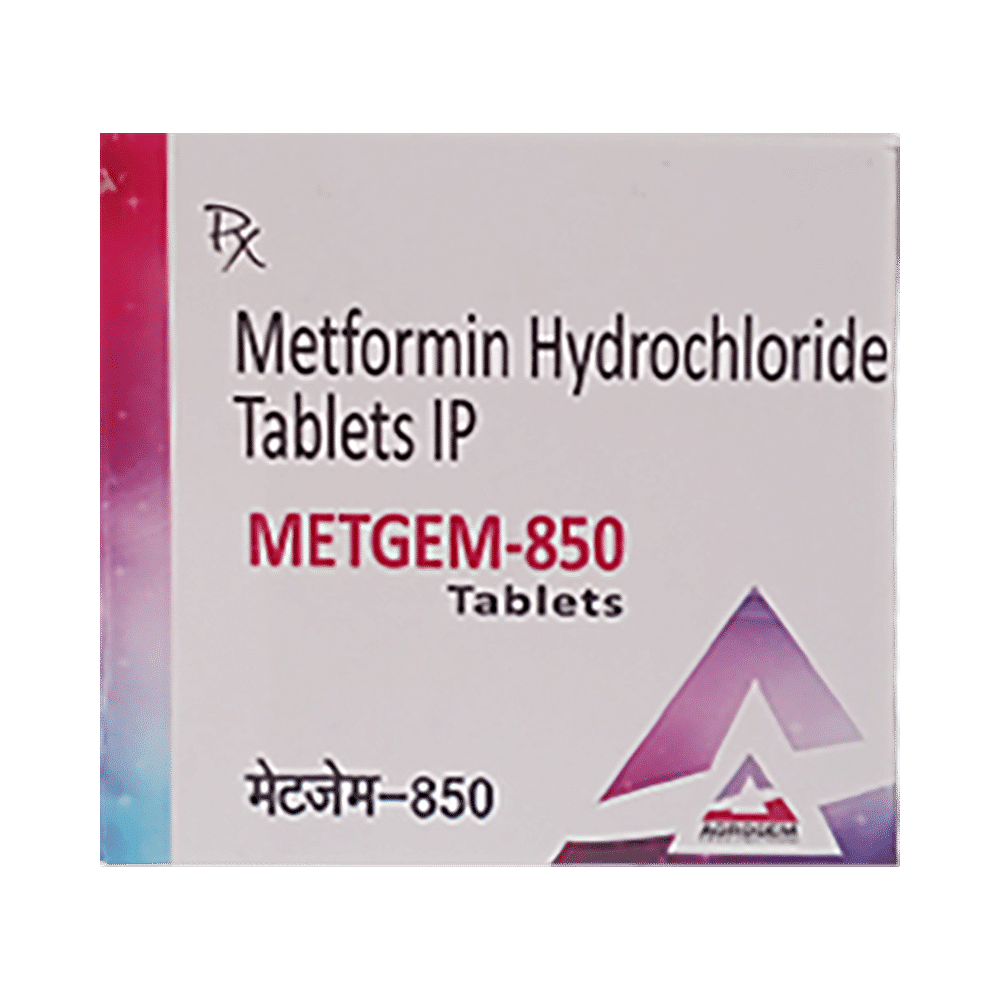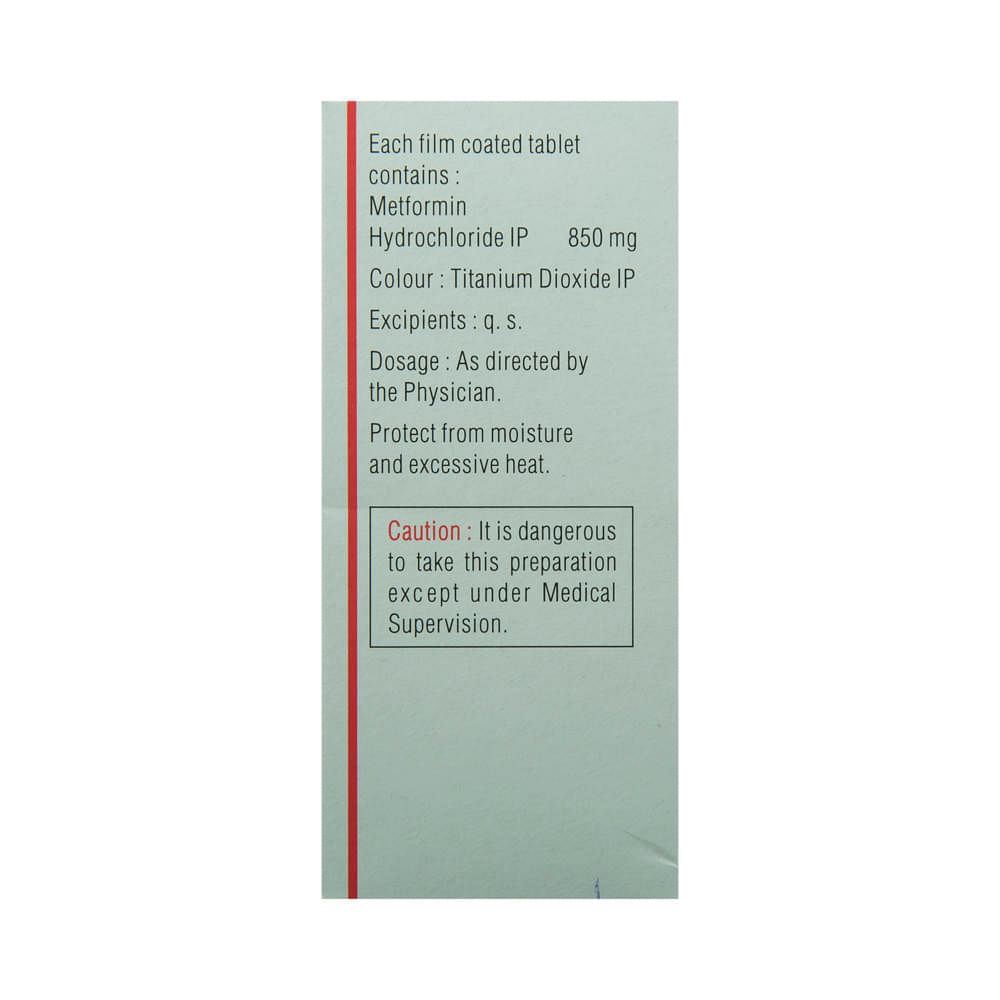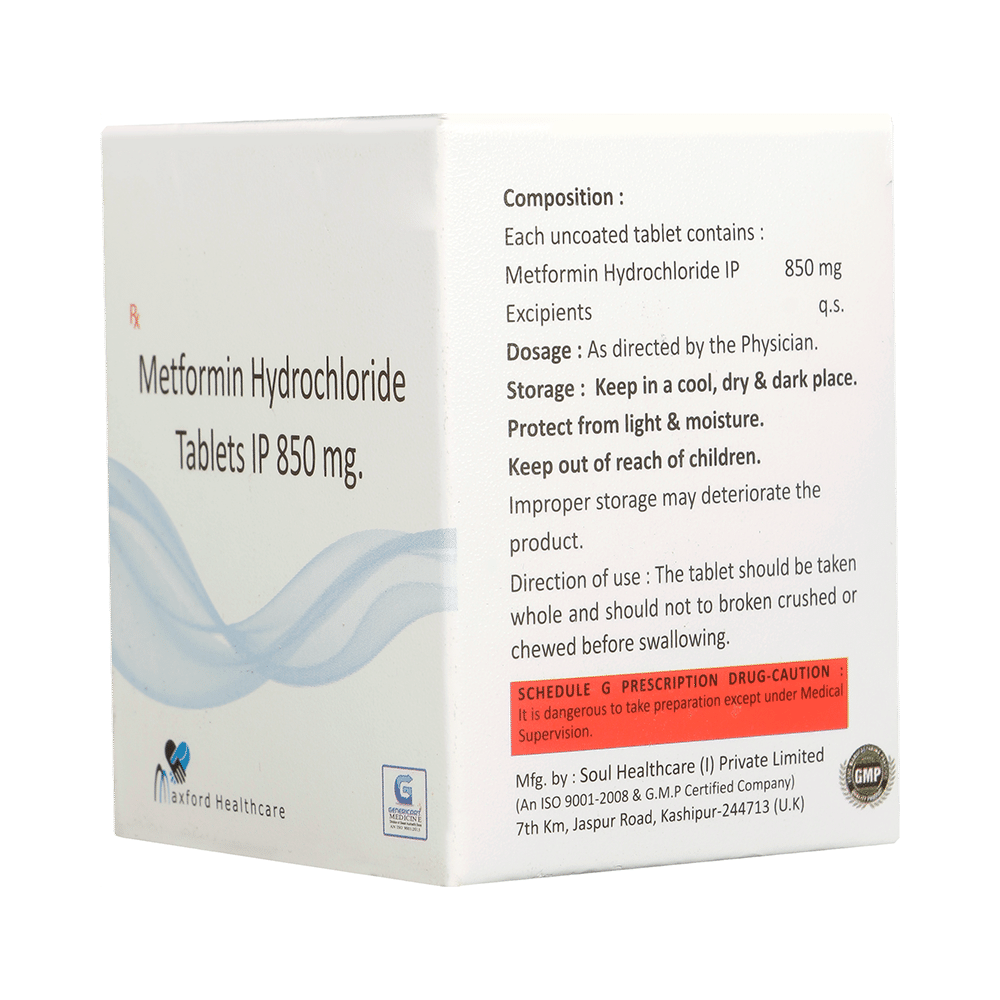


Metgem 850 Tablet
Manufacturer
Agron Remedies Pvt Ltd
Salt Composition
Metformin (850mg)
Key Information
Short Description
Metgem 850 Tablet is a medicine used to treat type 2 diabetes mellitus and Polycystic ovary syndrome (PCOS) in women, helping to control blood sugar levels and prevent serious complications.
Dosage Form
Tablet
Introduction
Metgem 850 Tablet is an anti-diabetic medication (biguanide) used to treat type 2 diabetes mellitus and Polycystic ovary syndrome (PCOS) in women. It helps control blood sugar levels and thus prevent serious complications of diabetes. It is also used to treat a menstruation-related disorder known as Polycystic ovary syndrome (PCOS) in women.
Directions for Use
Take this medicine in the dose and duration as advised by your doctor. Swallow it as a whole. Do not chew, crush or break it. Metgem 850 Tablet is to be taken with food.
How it works
Metgem 850 Tablet is an anti-diabetic medication (biguanide). It works by lowering glucose production in the liver, delaying the absorption of sugar (glucose) from the intestines, and increasing the body's sensitivity to insulin.
Quick Tips
You have been prescribed Metgem 850 Tablet to control the blood sugar level and reduce the risk of diabetic complications such as heart attacks. Hypoglycemia (low blood sugar level) may occur when taken along with other antidiabetic medicines, alcohol or on delaying/skipping a meal. Carry a sugar source with you for immediate relief. Tell your doctor immediately if you experience any deep or rapid breathing, persistent nausea, vomiting, and stomach pain as Metgem 850 Tablet may cause a rare but serious condition called lactic acidosis, which is an excess of lactic acid in the blood. Prolonged use of Metgem 850 Tablet may lead to vitamin B12 deficiency which may lead to anemia, causing fatigue, pale skin, shortness of breath or headache. Notify your doctor if you experience any of these as you may require supplements. Your doctor will monitor your blood sugar levels and kidney functions regularly while you are taking this medication.
Related Medicines

Glyciphage 850 Tablet

Glycomet 850 Tablet

Diabex 850mg Tablet

Metford 850mg Tablet

Metacure Ipr 850mg Tablet

MF 850 Tablet

Genericart Metformin Hydrochloride 850mg Tablet

Hilmet 850mg Tablet

Omet 850mg Tablet

Walmet 850mg Tablet
Frequently asked questions
What does Metformin 850 Tablet do exactly?
People with type 2 diabetes are not able to respond normally to the insulin made by their bodies. When this happens, the concentration of sugar/glucose increases in the blood. Metformin 850 Tablet acts in several ways to reduce the increased levels of sugar in blood. It decreases glucose production from the liver and decreases absorption of glucose from the intestine after taking food while improving the sensitivity of the body organs and muscles towards insulin. This helps improve the uptake of glucose from the blood.
Does Metformin 850 Tablet cause weight loss?
Yes, Metformin 850 Tablet has been shown to cause weight loss in people who are overweight or obese. It may also cause a modest loss in weight in those overweight and obese individuals who are at risk for diabetes. In addition, patients who are sensitive or resistant to insulin may also show weight loss. However, it's essential to consult your doctor before taking this medication solely for weight loss.
What are the benefits of taking Metformin 850 Tablet?
Metformin 850 Tablet is a medication that helps control blood sugar levels in patients with high blood sugar. It promotes the body's response to insulin made by the pancreas, decreases sugar production from the liver, and reduces sugar absorption by the intestines. Unlike other oral antidiabetic medications, Metformin 850 Tablet rarely causes low blood sugar when taken alone as it prevents the pancreas from secreting more insulin.
Can Metformin 850 Tablet make you sleepy?
Metformin 850 Tablet usually does not cause sleepiness and is well-tolerated. However, in rare cases, it may lead to sleep disorders or insomnia. Sleepiness can be due to a serious side effect called lactic acidosis, especially if the kidneys are not working properly. If you experience drowsiness or fatigue while taking Metformin 850 Tablet, contact your doctor immediately.
How to take Metformin 850 Tablet?
Take Metformin 850 Tablet with or after a meal. Do not crush or chew the tablets; instead, swallow them with a glass of water. Follow your doctor's instructions regarding the dosage frequency (e.g., one tablet per day with breakfast, two tablets divided into morning and evening doses). Taking Metformin 850 Tablet with meals can help reduce digestive problems like indigestion, nausea, vomiting, diarrhea, stomach ache, and loss of appetite.


